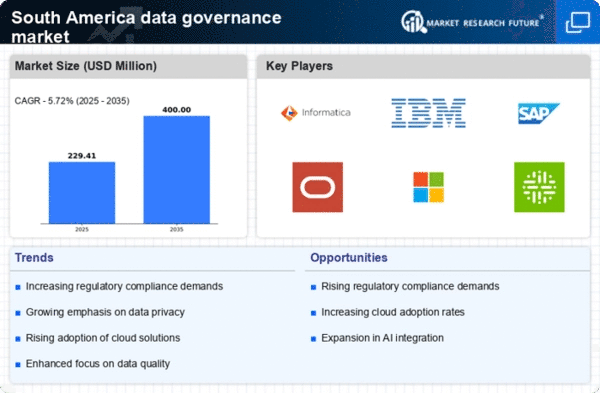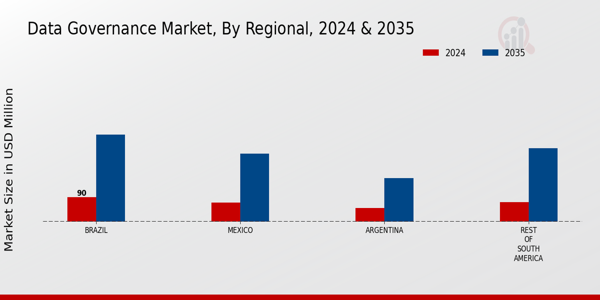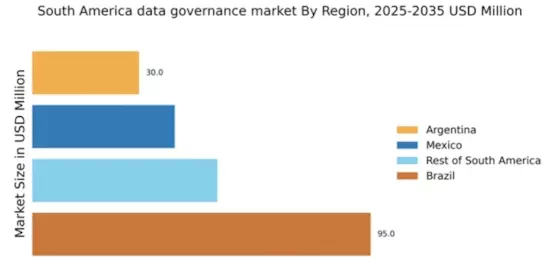Rising Data Privacy Concerns
In South America, the increasing awareness of data privacy issues is driving the data governance market. With the implementation of regulations such as the General Data Protection Law (LGPD) in Brazil, organizations are compelled to adopt robust data governance frameworks. This law mandates strict compliance regarding personal data handling, which has led to a surge in demand for data governance solutions. As companies strive to align with these regulations, the data governance market is expected to grow significantly. It is estimated that the market could reach a valuation of $1.5 billion by 2026, reflecting a compound annual growth rate (CAGR) of approximately 12% from 2023 to 2026. This trend indicates a strong focus on data protection and privacy, necessitating comprehensive governance strategies.
Focus on Operational Efficiency
The pursuit of operational efficiency is a significant driver of the data governance market in South America. Organizations are increasingly recognizing that effective data governance can streamline processes, reduce costs, and enhance productivity. By implementing governance frameworks, companies can minimize data-related risks and ensure compliance with regulations. This focus on efficiency is particularly relevant in industries such as manufacturing and logistics, where data plays a critical role in optimizing operations. It is estimated that organizations with strong data governance practices can reduce operational costs by up to 25%, making a compelling case for investment in governance solutions. As businesses strive to improve their operational performance, the data governance market is likely to experience sustained growth.
Growing Need for Data Integration
In South America, the proliferation of data sources is driving the need for effective data integration, which in turn fuels the data governance market. Organizations are faced with the challenge of managing disparate data systems, which can lead to inconsistencies and inefficiencies. As a result, there is a heightened demand for data governance solutions that facilitate seamless integration across various platforms. This need is particularly pronounced in sectors such as finance and healthcare, where data accuracy is crucial. The data governance market is expected to benefit from this trend, as companies seek to establish comprehensive governance frameworks that support data integration efforts. Analysts predict that the market could see a growth rate of 15% annually as organizations prioritize integration and governance.
Increased Adoption of Cloud Solutions
The shift towards cloud computing in South America is another key driver for the data governance market. As organizations migrate their data to cloud platforms, the need for effective governance becomes paramount. Cloud solutions offer scalability and flexibility, but they also introduce complexities in data management. Consequently, businesses are investing in data governance tools to ensure compliance, security, and data integrity in cloud environments. According to recent estimates, the cloud services market in South America is projected to grow by 20% annually, which correlates with the rising demand for data governance solutions. This growth suggests that organizations are increasingly recognizing the importance of establishing governance frameworks to manage their cloud-based data assets effectively.
Emergence of Data-Driven Decision Making
The trend towards data-driven decision making is reshaping the landscape of the data governance market in South America. Organizations are increasingly relying on data analytics to inform their strategic choices, which necessitates a strong governance framework to ensure data accuracy and reliability. As businesses harness the power of big data, the demand for data governance solutions is likely to rise. Companies that implement effective governance practices can enhance their operational efficiency and gain a competitive edge. It is estimated that organizations investing in data governance can improve their decision-making processes by up to 30%, highlighting the critical role of governance in leveraging data for business success. This trend underscores the growing recognition of data as a strategic asset.



















Leave a Comment